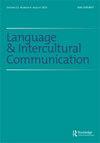他人有多“好”或“坏”:伊朗保护主义教育政策中的国家认同与跨文化遭遇
IF 2.2
1区 文学
0 LANGUAGE & LINGUISTICS
引用次数: 1
摘要
摘要跨文化交际能力被认为是对教条主义的民族偏见及其相关的自我夸大所产生的以自我为中心的偏见的一种开放的替代。虽然这是一个值得赞扬的建议,但它在外语教育中的实施并没有取得广泛的成功。最近对跨文化交际能力理论化的尝试似乎强调了交际中的可协商性,而牺牲了一些长期存在的问题,如(文化/民族)认同。这篇文章探讨了伊朗语言政策中跨文化交流的前景,因为伊朗有着与外国势力发生冲突的历史,最终导致了对民族主义、身份认同和对待他人的保护主义态度。本文章由计算机程序翻译,如有差异,请以英文原文为准。
How ‘good’ or ‘bad’ Others can be: national identity and intercultural encounters in the Iranian protectionist educational policies
ABSTRACT Intercultural communicative competence has been offered as an open-minded replacement for ego-centric biases stemming from dogmatic national prejudice and its associated self-aggrandisement. While being a commendable proposal, its implementation in foreign language education has not been a widespread success story. Recent attempts to theorise intercultural communicative competence seem to emphasise negotiability in communication at the expense of some persistent issues, such as (cultural/national) identity. This article examines the prospects of intercultural communication in Iranian language policy as a country with a history of troubled encounters with foreign powers, culminating in protectionist approaches to nationalism, identity and the treatment of Others.
求助全文
通过发布文献求助,成功后即可免费获取论文全文。
去求助
来源期刊

Language and Intercultural Communication
Multiple-
CiteScore
3.00
自引率
47.40%
发文量
50
期刊介绍:
Language & Intercultural Communication promotes an interdisciplinary understanding of the interplay between language and intercultural communication. It therefore welcomes research into intercultural communication, particularly where it explores the importance of linguistic aspects; and research into language, especially the learning of foreign languages, where it explores the importance of intercultural perspectives. The journal is alert to the implications for education, especially higher education, and for language learning and teaching. It is also receptive to research on the frontiers between languages and cultures, and on the implications of linguistic and intercultural issues for the world of work.
 求助内容:
求助内容: 应助结果提醒方式:
应助结果提醒方式:


